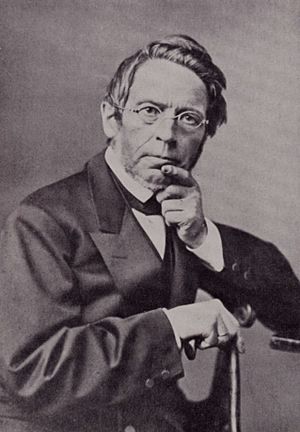Johann Gustav Droysen facts for kids
Quick facts for kids
Gustav Droysen
|
|
|---|---|
 |
|
| Born | 6 July 1808 |
| Died | June 19, 1884 (aged 75) Berlin, Brandenburg, German Empire
|
| Education | University of Berlin (PhD, 1831) |
| Era | 19th-century philosophy |
| Region | Western philosophy |
| School | Historism |
| Institutions | University of Berlin University of Kiel University of Jena |
| Thesis | De Lagidarum regno Ptolemaeo IV Philometore rege (1831) |
|
Main interests
|
Historical method |
|
Notable ideas
|
The erkennen–erklären–verstehen distinction |
|
Influences
|
|
|
Influenced
|
|
Johann Gustav Bernhard Droysen (born July 6, 1808 – died June 19, 1884) was an important German historian. He wrote a famous book about Alexander the Great. This book was one of the first to show a new way of thinking in German history. It focused on how powerful leaders, sometimes called "great men," shaped events.
Contents
Early Life and Education
Johann Gustav Bernhard Droysen was born in a town called Treptow in Pomerania. This area is now part of Poland. His father was a chaplain in the army. Young Droysen saw some battles during the War of Liberation. These early experiences made him very loyal to the Kingdom of Prussia.
He went to school in Stettin and then to the University of Berlin. From 1827 to 1829, he taught Felix Mendelssohn, a famous composer. Later, Droysen became a teacher at one of Berlin's oldest schools, the Graues Kloster. He also gave lectures at the University of Berlin. By 1835, he was a professor there.
Droysen's Early Historical Works
During these years, Droysen studied ancient Greece and Rome. He translated plays by Aeschylus and wrote about Aristophanes. But he became well known for his book, History of Alexander the Great, published in 1833. This book was considered the best work on Alexander the Great for a long time.
His work on Alexander helped start a new way of thinking about history in Germany. Droysen believed that power and success were very important in shaping history. He learned this idea from the philosopher Hegel. Droysen then wrote more books about Alexander's successors, called History of Hellenism. In these books, he created the term "Hellenistic" to describe the period after Alexander's conquests.
History Meets Politics
In 1840, Droysen became a history professor at the University of Kiel. Kiel was a center for a political movement. This movement wanted to protect the rights of the Elbe duchies, Schleswig and Holstein. Droysen used his knowledge of history to support these duchies.
He helped write a protest in 1844. This protest was against the King of Denmark, Christian VIII of Denmark. The king wanted to change the rules for who would inherit the duchies. This issue led to diplomatic talks and later to a war between Denmark and Prussia in the Second Schleswig War.
Droysen's first big political moment was in 1843. This was during the 1,000-year anniversary of the Treaty of Verdun. This treaty had divided Charlemagne's empire among his grandsons.
Supporting Prussian Leadership
In 1848, Droysen was chosen to be a member of the Frankfurt parliament. This was a revolutionary group that aimed to unite Germany. Droysen strongly believed that Germany should be united under the leadership of Prussia.
He famously said that the "German question" was a choice between Prussia and Austria. He saw Prussia as representing national interests and reform. Austria, he felt, was more about royal families and old ways. He believed Prussia was truly German, while Austria was not.
Droysen was one of the first members to leave the Frankfurt Parliament. This happened after King Frederick William IV of Prussia refused to become the emperor of a united Germany in 1849. For the next two years, Droysen kept supporting the duchies of Schleswig and Holstein. He wrote a book about Denmark's actions towards them. This book was very important in shaping German public opinion. It helped people understand the rights of the duchies in their fight with Denmark.
Focus on Prussian History
In his later years, Droysen mostly focused on the history of Prussia. After 1851, he became a professor at the University of Jena. In 1859, he moved back to Berlin and stayed there until he died.
In 1851, he wrote a biography of Count Yorck von Wartenburg. Many people consider this one of the best biographies in the German language. Then, he started his biggest work, The History of Prussian Politics. This huge project had 32 volumes. It covered the entire growth of the Prussian monarchy up to the year 1756. Like all of Droysen's work, this history showed his unique style. He liked to explore how important forces shaped historical events.
Family Life
Droysen was married twice and passed away in Berlin. His oldest son, Gustav, also became a historian. Gustav wrote several well-known books. These included a study of Gustavus Adolphus, the King of Sweden during the Thirty Years War. He also wrote about Duke Bernhard, another Protestant general from that war. Another son, Hans Droysen, wrote books about Greek history.
See also
 In Spanish: Johann Gustav Droysen para niños
In Spanish: Johann Gustav Droysen para niños
- Hermeneutics
- Verstehen

